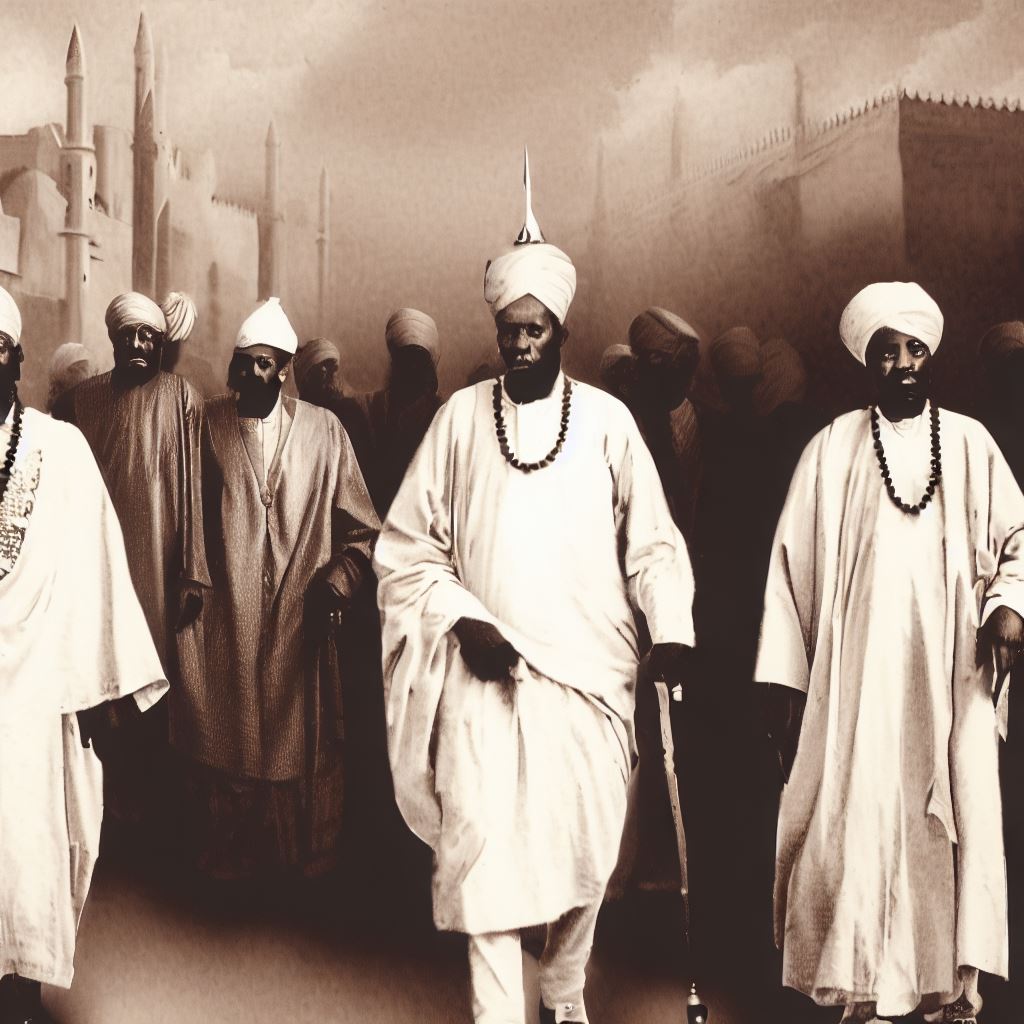Introduction
The historical impact of Imams on Nigerian society is a topic of great significance. Imams have played a pivotal role in shaping the religious and social fabric of Nigeria.
With a rich history dating back centuries, the role of Imams in Nigeria goes beyond that of religious leaders. They have been influential figures in the political, educational, and cultural spheres as well.
As spiritual leaders, Imams hold a position of authority and influence in the Muslim community and are highly regarded by their followers.
Their teachings and guidance have had a profound impact on the beliefs, values, and practices of Nigerian society.
Imams also serve as community leaders, resolving conflicts, promoting social cohesion, and providing critical support during challenging times.
In addition, they have been active in promoting education, establishing Islamic schools, and advocating for social justice.
The history of Imams in Nigeria is intertwined with the country’s struggle for independence and subsequent nation-building efforts.
They have been at the forefront of various movements, advocating for social and political change, and striving to uplift their communities.
The historical impact of Imams on Nigerian society cannot be overstated, as their influence transcends religious boundaries and extends to every aspect of Nigerian life.
In this blog post, we will delve deeper into the historical significance of Imams in Nigeria, exploring their role and contributions throughout different periods of Nigerian history.
Historical Context of Islam in Nigeria
The arrival and spread of Islam in Nigeria
Islam arrived in Nigeria during the 11th century through the Trans-Saharan trade routes. The northern regions of Nigeria, such as Kano and Sokoto, were the first to embrace Islam.
The spread of Islam was facilitated by Muslim traders, scholars, and missionaries who settled in different parts of the country.
This gradual spread led to the establishment of Islamic states and empires in Nigeria, most notably the Sokoto Caliphate.
The Sokoto Caliphate, founded by Usman dan Fodio in the early 19th century, played a significant role in the spread and consolidation of Islam.
The significance of Islamic teachings and practices in Nigerian culture
Islamic teachings and practices have had a profound influence on Nigerian culture throughout history. The introduction of Islam brought about a major shift in religious beliefs and practices in Nigeria.
Islamic teachings, as outlined in the Quran and Hadith, became the guiding principles for many Nigerians.
Islamic practices, such as daily prayers, fasting during Ramadan, and adherence to Islamic laws, became deeply embedded in Nigerian society.
The concept of social justice promoted by Islam resonated with Nigerians, especially those who were marginalized or oppressed.
The Islamic faith also influenced various aspects of Nigerian culture, including language and education.
Arabic, the language of the Quran, became an important medium of communication and was incorporated into Nigerian languages.
Islamic education flourished with the establishment of Quranic schools and Islamic centers, where students learned Arabic, Islamic theology, and jurisprudence.
Islamic scholars and imams played a pivotal role in preserving and promoting Nigerian languages, history, and literature.
Impact of Imams on the Nigerian Society
Imams, as spiritual leaders, have had a significant impact on Nigerian society. Imams provide spiritual guidance, lead daily prayers, and officiate religious ceremonies such as weddings and funerals.
They serve as community leaders, mediators, and advisors in resolving conflicts and addressing societal issues.
Imams play a vital role in promoting social welfare, charity, and philanthropy within their communities.
The historical impact of imams in Nigeria can be seen in their engagement in various political and social movements.
During the colonial era, imams led resistance movements against British colonization and acted as advocates for independence.
Imams have been active participants in political processes, advocating for the rights and interests of the Muslim community.
They have also been instrumental in fostering interfaith dialogue and peaceful coexistence between Muslims and other religious groups.
Imams continue to be influential figures in Nigeria, using their platforms to address societal challenges and promote unity.
In essence, the arrival and spread of Islam in Nigeria have had a profound historical impact on the country.
The teachings and practices of Islam have become deeply ingrained in Nigerian culture, shaping religious beliefs, social norms, and educational systems.
Imams, as spiritual leaders, have played a pivotal role in preserving Islamic traditions, promoting social welfare, and advocating for the rights of the Muslim community.
Read: A Day in the Life of a Nigerian Imam: Insight
Role of Imams in Nigerian Society
The Role of an Imam within the Islamic Faith
Imams in Nigerian society have been pillars of strength and agents of positive change. Their influence has been felt in various domains, including religion, education, politics, and social welfare.
By embracing their roles as spiritual leaders and community activists, they have significantly impacted Nigerian society throughout history.
Their commitment to Islamic values and teachings has provided guidance to individuals and communities alike, fostering social cohesion and fostering a sense of belonging.
Imams have safeguarded Islamic traditions and ensured their continuity by establishing educational institutions and facilitating the spread of knowledge.
Their dedication to scholarship has encouraged critical thinking and the pursuit of knowledge among Muslims in Nigeria.
Furthermore, through interfaith dialogues, Imams have bridged gaps between Muslims and followers of different religions, fostering harmonious relationships and dispelling misconceptions.
Specific Roles Imams have played in Nigerian Society Historically
In addition to their spiritual roles, Imams have actively engaged in the pursuit of social justice. They have advocated for the rights of the marginalized, fought against corruption, and stood against social evils.
By providing social welfare and charity work, Imams have alleviated suffering within their communities and ensured that the less fortunate receive support.
Imams have also played a crucial role in resolving conflicts, whether within their own community or between different religious groups.
Their impartiality, wisdom, and knowledge of Islamic teachings have been invaluable in fostering peaceful solutions and preventing violence.
By contributing to peacebuilding efforts, Imams have worked towards a united Nigeria where diversity is celebrated.
Through their guidance and support, Imams have helped individuals navigate personal challenges and dilemmas.
Their counseling services, particularly in matters of marriage and family, have been invaluable in strengthening familial bonds and ensuring emotional well-being.
Imams understand the importance of holistic development and have actively advocated for healthcare initiatives to promote the well-being of their communities.
By raising awareness, supporting medical facilities, and encouraging healthy practices, they have contributed to improving the overall health and quality of life in Nigeria.
In fact, the historical impact of Imams on Nigerian society has been profound.
Their roles as spiritual leaders, educators, social activists, and community organizers have shaped the country’s religious, social, and political landscapes.
Imams’ unwavering commitment to Islamic principles and their efforts towards social justice, education, interfaith harmony, and peacebuilding have positively influenced the lives of countless individuals, leaving an indelible mark on Nigerian society.
Read: Top Schools for Aspiring Imams in Nigeria
Contributions of Imams in Education
Imams in Nigeria have played a significant role in promoting education within their communities. Their efforts have had a profound impact on the literacy rates and overall educational development in the country.
Highlighting the efforts of Imams
- Imams have actively encouraged their followers to prioritize education and seek knowledge.
- They have emphasized the importance of education as a means to improve one’s life and contribute to society.
- Imams have organized and supported various educational programs and initiatives.
- Through sermons and teachings, they have instilled in people the value of education as an essential aspect of their religious duty.
- Imams have urged parents to send their children to school, regardless of their socio-economic backgrounds.
- They have used their positions of influence to challenge societal norms that hinder education, such as gender disparity in schools.
- Imams have actively engaged with local communities to raise awareness about the benefits of education.
- They have collaborated with government authorities and non-profit organizations to implement educational projects.
- Imams have also emphasized the need for Islamic education to be taught alongside secular subjects.
- By incorporating Islamic teachings into the curriculum, they have created a holistic approach to education.
Establishment of Islamic schools
One of the most significant contributions of Imams has been the establishment of Islamic schools, also known as madrasas.
Madrasas focus on providing the teachings of Islam alongside academic subjects, ensuring a comprehensive education for students.
- These schools introduce students to Islamic values and principles from an early age.
- Madrasas teach Arabic, Quranic studies, Islamic history, and other religious subjects.
- They also provide instruction in math, science, English, and other core subjects.
- Islamic schools promote a moral and ethical framework through the integration of Islamic teachings into the curriculum.
- Students learn about the importance of compassion, justice, and community service.
- The establishment of Islamic schools has had a positive impact on literacy rates, especially in rural areas where access to education is limited.
- Imams have actively supported the growth and development of these schools through fundraising and community involvement.
- They have encouraged parents to enroll their children in these institutions, ensuring the transmission of Islamic values and knowledge.
- Islamic schools have not only improved literacy rates but also contributed to a greater understanding and appreciation of Islam among the students.
- Graduates of these institutions often become leaders within their communities, spreading knowledge and promoting Islamic values.
In general, the contributions of Imams in promoting education within Nigerian society have been instrumental in improving literacy rates and fostering a sense of intellectual development.
Through their efforts and the establishment of Islamic schools, Imams have enabled individuals to gain knowledge and cultivate a deep understanding and appreciation of their faith and the world around them.
Read: Challenges Faced by Imams in Nigeria Today
Influence of Imams in Shaping Moral Values
How Imams have helped instill moral values in Nigerian society
- Imams have played a crucial role in instilling moral values in Nigerian society.
- Through their teachings, they have emphasized the importance of honesty, integrity, and compassion.
- Imams have encouraged individuals to lead righteous and virtuous lives.
- They have promoted the idea of treating others with kindness and respect.
- Imams have taught that stealing, lying, and cheating are morally wrong.
- They have emphasized the value of hard work and perseverance.
- Imams have urged individuals to prioritize their families and fulfill their responsibilities towards them.
- They have preached against domestic violence and encouraged mutual respect within households.
- Imams have played a significant role in discouraging immoral practices such as corruption and bribery.
- They have emphasized the importance of being accountable for one’s actions.
Promotion of social justice, equality, and charity through Islamic teachings
Imams have not only focused on individual moral values but also on societal values.
- They have promoted social justice and equality in Nigerian society.
- Imams have spoken against discrimination based on gender, ethnicity, or social status.
- They have emphasized the equal worth of every individual in the eyes of God.
- Imams have advocated for the fair treatment of all members of society.
- They have encouraged Muslims to act compassionately towards the less fortunate.
- Imams have fostered a sense of charity and generosity within the Nigerian society.
- They have highlighted the importance of helping those in need and giving to charity.
Impact of Islamic teachings on shaping moral values in Nigerian society
Islamic teachings have had a profound impact on shaping moral values in Nigerian society.
- Imams have based their teachings on the Quran, the holy book of Islam.
- They have interpreted Quranic verses to guide individuals towards moral righteousness.
- Imams have used stories and parables from Islamic history to instill moral lessons.
- They have drawn examples from the lives of Prophet Muhammad and his companions.
Imams have used effective methods to deliver their messages and shape moral values.
- They have delivered engaging and impactful Friday sermons.
- Imams have organized religious lectures and study circles.
- They have used social media platforms to reach a larger audience.
- Imams have been actively involved in educational institutions, teaching Islamic ethics.
- They have offered counseling and guidance to individuals facing moral dilemmas.
- Imams have provided mentorship to young Muslims, guiding them towards moral excellence.
In short, the influence of Imams in shaping moral values in Nigerian society cannot be overstated. They have played a vital role in promoting virtues, fostering equality, and encouraging acts of charity.
Imams have effectively utilized Islamic teachings to instill moral values in individuals and the wider society. Their efforts have contributed to the overall moral development of Nigerian society.
Read: Education Needed to Become an Imam in Nigeria

Imams as Community Leaders
The role of Imams as community leaders and their influence over social, economic, and political matters
Imams play a significant role as community leaders, exerting influence over various aspects of Nigerian society.
They contribute to the social, economic, and political development of their communities through their religious positions.
1. Social Influence
- Imams serve as spiritual guides, providing moral and ethical guidance to their communities.
- They promote unity and harmony, fostering a sense of belonging among the people.
- Imams actively engage in resolving conflicts and mediating disputes within the community.
2. Economic Influence
- Imams encourage economic development by promoting entrepreneurship and business initiatives.
- They organize and facilitate cooperative societies, encouraging savings and investments among their followers.
- Imams often establish charity organizations and initiatives, providing financial support to the less fortunate.
3. Political Influence
- Imams hold considerable sway over their followers’ political choices and influence their voting patterns.
- They advocate for good governance and justice, ensuring that the rights of the people are protected.
- Imams actively participate in political discussions, addressing societal issues and representing the interests of their communities.
Specific instances where Imams have contributed to community development
Specific instances exemplify the influential role of Imams in community development:
1. Education and Literacy
- Many Imams have established Quranic schools, promoting Islamic education and literacy in remote areas.
- Through these efforts, they enable children and adults to gain knowledge, empowering them to lead better lives.
2. Healthcare Initiatives
- Imams often organize medical camps and campaigns, providing healthcare services to underserved communities.
- They raise awareness about hygiene, disease prevention, and the importance of vaccinations in improving public health.
3. Poverty Alleviation
- Imams frequently initiate and support poverty alleviation programs, assisting families in need.
- They distribute Zakat (Islamic alms) and encourage their followers to engage in charitable activities, reducing socioeconomic disparities.
4. Environmental Conservation
- Imams promote environmental stewardship, advocating for sustainable practices such as tree planting and waste management.
- They raise awareness about the Islamic principle of respecting and protecting the environment, inspiring their communities to take action.
5. Conflict Resolution
- Imams actively mediate disputes, preventing conflicts from escalating into violence within their communities.
- Through counseling and peaceful dialogue, they promote understanding and harmony among conflicting parties.
6. Women Empowerment
- Many Imams initiate initiatives to promote women’s rights and empowerment in conservative societies.
- They advocate for access to education, healthcare, and economic opportunities for women, challenging societal norms.
In a nutshell, Imams hold crucial positions as community leaders, impacting Nigerian society in various ways.
They foster social cohesion, encourage economic development, and participate in political matters.
Through their contributions and initiatives, Imams play a vital role in community development and upliftment, leaving a lasting historical impact on Nigerian society.
Imams’ Contributions to Interfaith Dialogue
The efforts of Imams in promoting peaceful coexistence and interfaith dialogue within Nigeria
- Imams play a significant role in promoting peaceful coexistence and interfaith dialogue in Nigeria.
- They encourage followers to respect and learn from different religious beliefs in the country.
- By emphasizing the importance of understanding and tolerance, Imams foster harmony among diverse communities.
- Imams organize interfaith conferences and events to bring people from various religious backgrounds together.
- Through these initiatives, they provide platforms for open discussions and exchange of ideas.
Imams in Nigeria have successfully led interfaith collaborations that have positively impacted society.
Examples of Successful Interfaith Collaborations Led by Imams
- The Interfaith Mediation Centre, co-founded by Imam Muhammad Ashafa, has reconciled warring communities.
- Imam Muhammad Marwa initiated the Kaduna Peace Declaration, bringing together religious leaders to promote peace.
- Imams and Christian pastors in Kaduna organized joint prayers to denounce violence after a terrorist attack.
- A coalition of Imams and pastors established the National Interfaith and Religious Organizations for Peace.
- Imams and Christian leaders collaborated to establish peace committees in troubled regions of Nigeria.
These successful collaborations demonstrate the influential role that Imams play in building bridges between different religious groups.
They actively engage in dialogue with leaders of other religions and highlight shared values. Imams show that religion can be a unifying force rather than a source of conflict.
Benefits of Interfaith Dialogue Led by Imams
- Interfaith dialogue promoted by Imams fosters understanding and breaks down stereotypes.
- It encourages mutual respect, thereby reducing religious tensions and promoting peaceful coexistence.
- Imams’ efforts in interfaith dialogue contribute to social harmony and national unity.
- These initiatives help to address misconceptions about Islam and build trust among different religious communities.
- By working together, Imams and religious leaders build networks that promote religious tolerance and cooperation.
The contributions of Imams to interfaith dialogue ultimately lead to strengthened relationships between different religious communities.
They foster an atmosphere of peace, respect, and understanding, which is crucial for Nigeria’s social fabric.
Imams’ efforts in promoting interfaith cooperation lay the foundation for a united and inclusive society.
The historical impact of Imams on Nigerian society cannot be overlooked, particularly regarding interfaith dialogue.
They actively work towards peaceful coexistence and act as ambassadors for religious harmony.
Imams’ contributions in fostering interfaith collaborations and promoting dialogue have resulted in positive social change.
Through their efforts, Nigeria continues to progress as a nation where diverse religious communities live in harmony.
The role of Imams in interfaith dialogue should be cherished and encouraged as they strive to build a united and inclusive society.
Challenges Faced by Imams in Nigeria
Challenges and obstacles faced by Imams in fulfilling their roles
- Fulfilling their roles amidst religious extremism: Imams face the challenge of combating extremist ideologies that go against the teachings of Islam.
- Political interference in religious affairs: Imams often encounter political interference, as politicians attempt to influence religious matters for personal gain.
- Misconceptions about Islam: Imams work tirelessly to dispel misconceptions about Islam that lead to discrimination and prejudice.
- Lack of proper training and education: Some Imams may face challenges due to the lack of access to reputable training and education institutions.
- Financial constraints: Imams often struggle with limited financial resources, hindering their ability to fulfill their roles effectively.
- Cultural resistance to change: Imams encounter resistance from traditional and cultural practices that may contradict Islamic teachings.
- Maintaining unity within the Muslim community: Imams face the challenge of fostering unity among diverse Muslim communities with varying opinions and traditions.
- Dealing with societal pressures and expectations: Imams often face immense pressure to address societal issues and expectations while remaining true to Islamic principles.
- Ensuring religious tolerance and promoting peaceful coexistence: Imams play a crucial role in promoting religious tolerance and fostering peaceful coexistence among people of different faiths.
- Safeguarding against external influences: Imams need to safeguard their communities against external influences that may poorly impact their religious practices.
Issues such as religious extremism, political interference, and misconceptions about Islam
- Balancing religious and social responsibilities: Imams must strike a balance between religious obligations and their roles as community leaders in addressing social concerns.
- Overcoming language and communication barriers: Imams face challenges when they need to communicate effectively with a diverse population that speaks different languages.
- Handling prejudices and discrimination: Imams confront prejudices and discrimination based on their religious identity, making their role more challenging.
- Navigating the complexities of modern society: Imams must adapt their teachings to address modern social issues while staying rooted in Islamic principles.
- Engaging with technology and media: Imams face the challenge of effectively engaging with technology and media platforms to convey their messages in the digital age.
- Providing guidance for complex ethical dilemmas: Imams are often sought out for guidance in navigating complex ethical dilemmas that arise in contemporary society.
- Building bridges between different generations: Imams play a crucial role in bridging the generational gap within Muslim communities and fostering understanding.
- Countering the influence of radical ideologies: Imams face the challenge of countering the influence of radical ideologies that may lead to violence and extremism.
- Coping with limited resources and infrastructure: Imams often lack proper resources and infrastructure to effectively carry out their duties and reach their communities.
- Maintaining personal well-being while supporting others: Imams must prioritize their personal well-being while providing support and guidance to others in their community.
Basically, Imams in Nigeria face numerous challenges in fulfilling their roles as religious leaders.
From countering extremism to political interference and tackling misconceptions, they play a vital role in promoting peace, unity, and tolerance within Nigerian society.
Despite the obstacles they face, their dedication and resilience continue to have a profound impact on the nation’s religious landscape.
Conclusion
The Imams have had a profound historical impact on Nigerian society. They have not only served as religious leaders but also as moral guides and social advocates.
The ongoing significance and relevance of Imams in contemporary Nigerian culture cannot be overstated. They continue to play a crucial role in fostering unity, peace, and harmony within communities.
Publish Your Professional Profile, Business or Brand
Showcase your expertise, gain trust, and boost visibility instantly on Professions.ng.
Publish NowIt is essential to recognize and appreciate the contributions of Imams in shaping Nigerian society. Their teachings and actions have promoted tolerance, justice, and compassion among the Nigerian people.
As Nigeria continues to navigate through various social and political challenges, the guidance and leadership of Imams are more critical than ever.
hey provide a sense of stability and hope amidst uncertainty.
By embracing the values imparted by Imams, Nigerian society can work towards a more equitable and inclusive future.
It is through this recognition and appreciation that we can build a stronger and more united nation.
Therefore, let us acknowledge the immense impact of Imams and honor them for their dedication in shaping Nigeria’s rich cultural and religious heritage.




